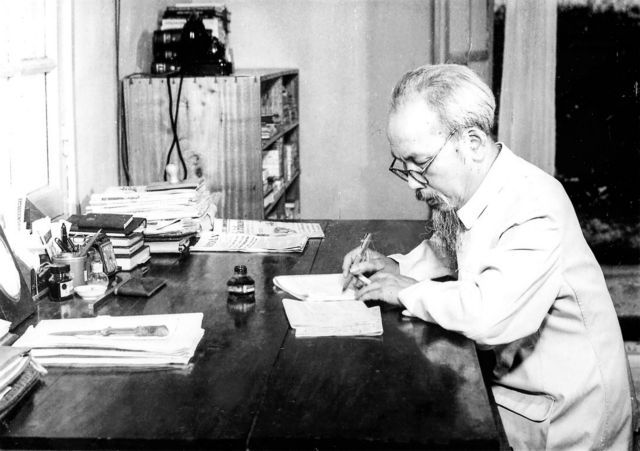 Society
Society


|
| Late President Hồ Chí Minh worked at his house in 1957. — VNS File Photo |
HÀ NỘI – In early 1941, Hồ Chí Minh walked across the Chinese border and entered the jungle of north Việt Nam determined to lead a revolution: to drive foreign invaders out of his country and liberate it, or to die trying.
At that time, the vast majority people in Viet Nam were not familiar with the name Hồ Chí Minh.
In 1969, everybody in the country cried over his death.
He died six years before his dream finally came true. In 1975, the Vietnamese liberation forces took the South Vietnamese city of Saigon and renamed it Hồ Chí Minh City in his honour.
He might not have lived to witness what he spent his life fighting for, but his legacy remains.
The testament
In 1965, Hồ Chí Minh started to write his last testament. The first draft was only 800 words long. Over the next four years, he rewrote and changed the piece from time to time. The final version was completed in 1969.
The first paragraphs of the document are about the Party, one of the issues the late President spent much time considering throughout his revolutionary life because the Party played a decisive role in the victories of the revolution.
According to President Hồ Chí Minh, the ruling Party’s mandate is to lead the social classes and the nation to successfully build a socialist society. To fulfil this mission, the Communist Party of Vietnam must set an example of morality.
In his testament, he wrote: “Within the Party organisation, establishing broad democracy and practising self-criticism and criticism regularly and seriously is the best way to consolidate and develop solidarity and unity.
"Every member and cadre of the Communist Party must truly be imbued with revolutionary morals, be hard-working, practising thrift, integrity and righteousness, and be public-spirited and selfless. It is a must to keep our Party clean and worthy of being the loyal leader and servant to the people."
Professor Hoàng Chí Bảo from the Hồ Chí Minh Academy of Politics said studying and following Hồ Chí Minh’s morality is important to national construction and development today as the Vietnamese Party and State fight the degradation of political thought, ethics and lifestyle, as well as manifestations of “self-evolution” and “self-transformation” among cadres and Party members.
The late President had always been sure about what a transparent ruling Party should be. In Hồ Chí Minh’s Thought, as the founder, leader and trainer of the Party, he wrote: "Besides the interests of the motherland and the people, the Party has no other benefit."
He wrote in the same work: "A Party that conceals its fault is a corrupt Party. A Party that dares to condemn its shortcomings, define the cause and circumstances which resulted in such limitations and look for ways to correct that defect, that is a progressive, forcible, righteous and genuine Party.”
After discussing the Party, Hồ Chí Minh talked about the importance of education for the country’s next generation.
He wrote: “The Party must foster their revolutionary virtues and train them to be our successors… The training and education of future revolutionary generations is of great importance and necessity.”
Bùi Đình Phong, a senior lecturer at the Hồ Chí Minh National Academy of Politics and Public Administration, said the late President experienced many hardship and challenges during his youth. Throughout his life, Hồ Chí Minh held high regard for the role of young people in the country’s fate.
In 1947, in his letter to the youth, the late President affirmed that the youth were the country’s future masters. He said if the youth wanted to be worthy of this title, they must educate and train their spirit and work hard to prepare for the future. Youth education must be closely attached to social struggles to help them avoid hazardous elements and negative practices, and to learn good and progressive practices.
“Young people must be ready to go where the Party needs them and to do difficult tasks when the Party asks them to,” he wrote.
Last words
In his 1,000-word will, Hồ Chí Minh used just a few words to talk about his personal matters.
“All my life, I have served the Homeland, the revolution and the people with all my heart and strength," he wrote. "If I should now depart from this world, I would have nothing to regret, except not being able to serve longer and more.
When I am gone, a grand funeral should be avoided in order not to waste the people’s time and money.”
A part of his wish – that his remains be cremated – was only made public later. The Political Bureau said that the reason the Party and State “begged to act in a way that was at variance with his recommendation” was because they found it was necessary to preserve Uncle Ho’s body so that in future, people throughout the country, particularly compatriots in the South and foreign friends, could come pay tribute to him and express their deep feelings for him. — VNS




